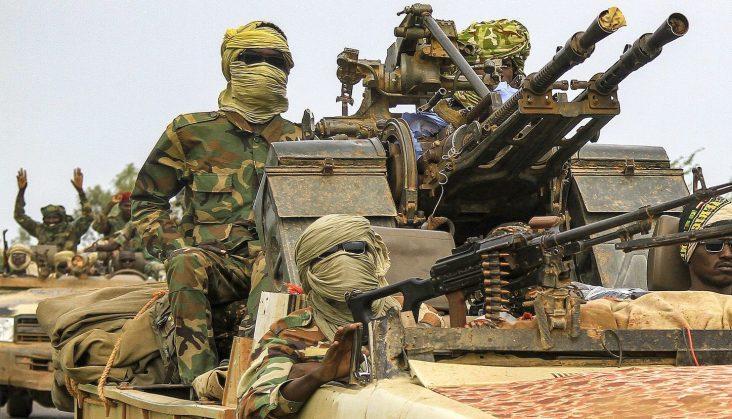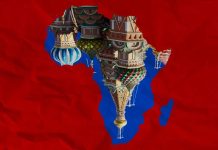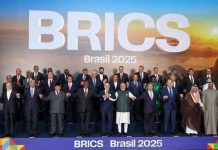Africa-Press – Mauritius. The military has returned to prominence in Africa over the last two years, increasingly asserting its political power and entering the popular imagination as a viable alternative to multiparty politics.
While the vast majority of African citizens continue to reject military rule, some recent coups were celebrated by citizens. Moreover, there is growing evidence that it is feasible to secure and sustain power via the barrel of a gun.
While countries, such as Mali and Sudan, experienced considerable instability, with one coup quickly followed by another, none of the states that experienced a military takeover in the last four years has returned to elected government. The bad news for Burkina Faso, Gabon, Mali, Niger and Sudan is therefore that recent coups are only likely to deepen their problems.
During the fevered debate about what caused this trend, one issue has been conspicuous by its absence: what does the military actually do when it governs? This question is particularly pressing given that the continent’s new juntas are entrenching their hold on power.
On 16 September, Burkina Faso, Mali and Niger signed a mutual security pact to defend one another in the event of “external aggression”, including a possible intervention by the Economic Community of West African States (ECOWAS) to restore civilian rule.
This was followed by an announcement that the return to civilian rule in Burkina Faso was postponed because elections were “not a priority” for Captain – and president – Ibrahim Traore.
The people of Burkina Faso, Gabon, Mali, Niger and Sudan are therefore likely to live under a version of military rule for some time to come. Sadly, the evidence from the history of military rule in Africa is not good.
Military regimes typically commit worse human rights abuses than their civilian counterparts, while being just as corrupt and even more likely to trigger conflict and instability.
Military governments have a terrible record because they replicate some of the worst features of multiparty politics, like winner-takes-all forms of clientelism, while having fewer constraints on the abuse of power.
This means that armies in power often become riven with the same divisions that previously undermined multiparty politics, fail to effectively problem-solve when things go wrong, and struggle to respond to the needs of citizens.
The bad news for Burkina Faso, Gabon, Mali, Niger and Sudan is therefore that recent coups are only likely to deepen their problems. This is not the first time the idea that military governments might do a better job than their civilian counterparts has come to the fore.
Immediately after independence the continent suffered its ‘first crisis of democracy’. The implosion of multiparty systems and the onset of civil wars in places like the Democratic Republic of Congo led to growing concern that divisive multiparty competition would exacerbate ethnic tensions.
While Tanzania’s Julius Nyerere argued that the one party-state was the best system of government for Africa because it would promote cohesion, others hoped that the military regimes that took power after periods of conflict or coups would prove to be more efficient and effective.
This rested on the assumption that the strict hierarchy within the army and its emphasis on protecting the nation would usher in a period of unity. These hopes were quickly dashed.
Between 1960 and 1990 no military regime delivered sustained economic growth or built a strong national infrastructure. Instead, the vast majority became mired in corruption, committed human rights abuses, and often became unstable, contributing to a dangerous spiral of political violence.
It is possible that today’s military regimes have learned from the mistakes of the past. Yet some of the chronic challenges that the army faces in power are likely to prove extremely difficult to overcome.
However strong military unity is before a coup, it tends to deteriorate thereafter. Holding power and controlling resources exacerbates internal competition and corruption.
Over the last 70 years, military governments have proved to be some of the most venal on the continent. Sanni Abacha, who became Nigerian president following a coup in 1993, is said to have stolen billions of dollars.
The scale of the theft was so great that Enrico Monfrini, who spent 20 years trying to hunt down the stolen money, successfully argued that “the Abacha family and their associates” should be officially treated as a “criminal organisation”.
The vast sums of money involved intensify factional power struggles. One consequence of this has been violent competition for supremacy within the military itself.
Data collected by Jonathan Powell and Clayton Thyne reveals that of the 36 countries to experience a coup since 1950, only 12 (33%) experienced a single coup. 11 countries (31%) witnessed two or three coups, nine states (25%) saw four or five coups, while Burkina Faso has now suffered eight.
The idea that military rule delivers security and stability is therefore inherently flawed. This means that even when a military government starts to show signs of progress – as with Thomas Sankara’s government in Burkina Faso in the 1980s – they risk being violently cut short.
In Sankara’s case, he governed for only four years before being assassinated in a coup led by his former colleague, Blaise Compaoré. Sadly military violence is not only directed at the political elite.
Military regimes face few constraints on the abuse of power, not least because they tend to suspend the existing constitution and then introduce a new legal framework that includes far fewer checks and balances.
Military regimes so often respond to evidence of public resistance and disapproval by centralising power and repressing rivals. Armies are also inherently resistant to the idea of dissent and opposition.
As Christopher Hood argues, organisations that train their officers to believe that success comes from hierarchy and discipline tend to interpret policy failures as evidence that there is insufficient top-down control.
This helps to explain why military regimes so often respond to evidence of public resistance and disapproval by centralising power and repressing rivals.
In Sudan, for example, the government of Omar al-Bashir, established after a coup in 1989, is accused of widespread human rights abuses, including a genocide in Darfur.
The challenge for military governments that do not rapidly descend into repression and conflict is how to actually govern without politics and political parties.
While military leaders such as Uganda’s Yoweri Museveni tend to dislike parties on the basis that they can breed division, the reality is that parties play a key role in relaying popular concerns to decision-makers.
As Henry Bienen’s research in the 1960s revealed, long-lasting military governments often resorted to establishing political parties or some form of civilian representation to both legitimise their rule and tap into public opinion.
The more successful governments to emerge from military or rebel leaders, such as the Jerry Rawlings regime in Ghana or Paul Kagame’s Rwanda, built mass political organisations for just this reason.
In most cases, however, the attempts by military governments to play politics have been unsuccessful, because these organisations and leaders did not have the authority to deliver on either public services or meaningful political participation.
Some of the juntas that have emerged in recent years have nominally transferred power to a civilian administration because they were forced to do so during negotiations with the international community.
In reality, real power in these countries remains in military hands. This is powerfully illustrated by the 2021 ‘coup within a coup’ in Mali, which removed a civilian administration that had started to behave too independently.
The outward appearance of civilian rule should therefore not blind us to the stark reality that the return of armies to power represents a profound threat to human rights, stability and development in West Africa – and beyond.
For More News And Analysis About Mauritius Follow Africa-Press







